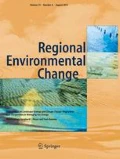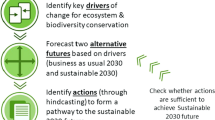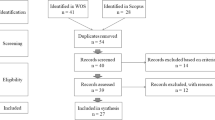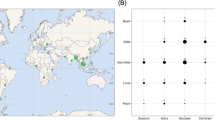Abstract
The mullet fishery system encompasses a complex arrange of ecological and socioeconomic factors interacting in multiple scales on the Southern-Southeastern Brazilian coast. Similarly, to other fisheries in developing countries, overfishing and poor governance have been threatening the resilience of the mullet fishery. In this paper, we explore aspects related to fisheries management from the perspective of the concept of resilience. The industrial and artisanal fishery sectors represent the different stakeholders. The main issues of concern are related to failures in the fisheries management to properly address equity in resource access and resource use sustainability among stakeholders. Asymmetry in technology and political and economic power affect food security and income generation especially for subsistence and small-scale fishing. Despite changes in rules-in-use, overfishing and conflicts between resource users are still relevant. Fishery dynamics and resource availability are greatly affected locally by forces such as pollution, urbanization, non-selective fishing, and regionally, by the El Niño Southern Oscillation (ENSO), and industrial (purse-seine) fishery. Considering the influence of ENSO on this fishery, a time span of at least 7 years to investigate this system could provide better answers to improve the management. Effective resilient fisheries should rely on three aspects. First, there should be a flexible fish allocation system based on ecosystem variability. Secondly, fish allocation should prioritize food security and poverty alleviation. Thirdly, a monitoring system should be implemented that takes into consideration ecosystem, fisheries and human dimensions to support a flexible and adaptive fisheries management, with resilient fisheries as an ultimate goal.





Similar content being viewed by others
References
Abel N, Cumming DHM, Anderies JM (2006) Collapse and reorganization in social-ecological systems : questions, some ideas, and policy implications. Ecol Soc 11:17. https://doi.org/10.5751/es-01593-110117
Acheson JM (2006) Institutional failure in resource management. Annu Rev Anthropol 35:117–134. https://doi.org/10.1146/annurev.anthro.35.081705.123238
Adger WN, Hughes TP, Folke C, Carpenter SR, Rockström J (2005) Social-ecological resilience to coastal disasters. Science 309:1036–1039. https://doi.org/10.1126/science.1112122
Allen CR, Angeler DG, Garmestani AS, Gunderson LH, Holling CS (2014) Panarchy : theory and application. Ecosystems 17:578–589. https://doi.org/10.1007/s10021-013-9744-2
Allison EH, Perry AL, Badjeck M-C, Neil Adger W, Brown K, Conway D, Halls AS, Pilling GM, Reynolds JD, Andrew NL, Dulvy NK (2009) Vulnerability of national economies to the impacts of climate change on fisheries. Fish Fish 10:173–196. https://doi.org/10.1111/j.1467-2979.2008.00310.x
Armitage DR, Plummer R, Berkes F, Arthur R, Charle AT, Hunt D, Iain J, Diduck AP, Doubleday NC, Johnson DS, Marschke M, McConney P, Pinkerton EW, Wollenberg EK (2009) Adaptive co-management for social–ecological complexity. Front Ecol Environ 7:95–102. https://doi.org/10.1890/070089
Beddington JR, Agnew DJ, Clark CW (2007) Current problems in the management of marine fisheries. Science 316:1713–1716. https://doi.org/10.1126/science.1137362
Béné C, Arthur R, Norbury H, Allison EH, Beveridge M, Bush S, Campling L, Leschen W, Little D, Squires D, Thilsted SH, Troell M, Williams M (2016) Contribution of fisheries and aquaculture to food security and poverty reduction : assessing the current evidence. World Dev 79:177–196. https://doi.org/10.1016/j.worlddev.2015.11.007
Berkes F, Mahon R, McConney P, Pollnac R, Pomeroy R (2001) Managing small-scale fisheries: alternative directions and methods. International Development Research Centre, Ottawa
Bianchi G, Skjoldal HR (2008) The ecosystem approach to fisheries. Centre for Agriculture and Bioscience International, Wallingford
Brazilian Ministry for Fisheries and Aquaculture (2015) Plano de gestão para o uso sustentável da tainha, Mugil liza Valenciennes, 1836, no Sudeste e Sul do Brasil. Ministério da Pesca e Aquicultura, Brasília
Brierley AS, Kingsford MJ (2009) Impacts of climate change on marine organisms and ecosystems. Curr Biol 19:602–614
Bunce M, Mee L, Rodwell LD, Gibb R (2009) Collapse and recovery in a remote small island—a tale of adaptive cycles or downward spirals ? Glob Environ Chang 19:213–226. https://doi.org/10.1016/j.gloenvcha.2008.11.005
Cochrane KL, Andrew NL, Parma AM (2011) Primary fisheries management: a minimum requirement for provision of sustainable human benefits in small-scale fisheries. Fish Fish 12:275–288. https://doi.org/10.1111/j.1467-2979.2010.00392.x
Creighton C, Hobday AJ, Lockwood M, Pecl GT (2016) Adapting management of marine environments to a changing climate : a checklist to guide reform and assess progress. Ecosystems 19:187–219. https://doi.org/10.1007/s10021-015-9925-2
Crowder L, Norse E (2008) Essential ecological insights for marine ecosystem-based management and marine spatial planning. Mar Policy 32:772–778. https://doi.org/10.1016/j.marpol.2008.03.012
Doney SC, Ruckelshaus M, Duffy JE, Barry JP, Chan F, English CA, Galindo HM, Grebmeier JM, Hollowed AB, Knowlton N, Polovina J, Rabalais NN, Sydeman WJ, Talley LD (2012) Climate change impacts on marine ecosystems. Annu Rev Mar Sci 4:11–37. https://doi.org/10.1146/annurev-marine-041911-111611
Eriksson H, Adhuri DS, Adrianto L, Andrew NL, Apriliani T, Daw T, Evans L, Garces L, Kamanyi E, Mwaipopo R, Purnomo AH, Sulu RJ, Beare DJ (2016) An ecosystem approach to small-scale fi sheries through participatory diagnosis in four tropical countries. Glob Environ Chang 36:56–66. https://doi.org/10.1016/j.gloenvcha.2015.11.005
Fletcher WJ, Bianchi G (2014) The FAO - EAF toolbox: making the ecosystem approach accessible to all fisheries. Ocean Coast Manag 90:20–26. https://doi.org/10.1016/j.ocecoaman.2013.12.014
Fletcher PJ, Kelble CR, Nuttle WK, Kiker GA (2014) Using the integrated ecosystem assessment framework to build consensus and transfer information to managers. Ecol Indic 44:11–25. https://doi.org/10.1016/j.ecolind.2014.03.024
Folke C (2006) Resilience : the emergence of a perspective for social–ecological systems analyses. Glob Environ Chang 16:253–267. https://doi.org/10.1016/j.gloenvcha.2006.04.002
Folke C, Pritchard L Jr, Berkes F, Colding J, Svedin U (2007) The problem of fit between ecosystems and institutions: ten years later. Ecol Soc 12:30. https://doi.org/10.5751/es-02064-120130
Folke C, Carpenter SR, Walker B, Scheffer M, Chapin T, Rockström J (2010) Resilience thinking: integrating resilience, adaptability and transformability. Ecol Soc 15:20. https://doi.org/10.5751/es-03610-150420
Fontoura NF, Vieira JP, Becker FG, Rodrigues LR, Malabarba LR, Schulz UH, Möller OO, Garcia AM, Vilella FS (2016) Aspects of fish conservation in the upper Patos Lagoon basin. J Fish Biol 89:315–336. https://doi.org/10.1111/jfb.13005
Garbin T, Castello JP, Kinas PG (2014) Age, growth, and mortality of the mullet Mugil liza in Brazil’s southern and southeastern coastal regions. Fish Res 149:61–68. https://doi.org/10.1016/j.fishres.2013.09.008
Garcia S, Cochrane K (2005) Ecosystem approach to fisheries: a review of implementation guidelines. ICES J Mar Sci 62:311–318. https://doi.org/10.1016/j.icesjms.2004.12.003
Garcia AM, Vieira JP, Winemiller KO, Grimm AM (2004) Comparison of 1982–1983 and 1997–1998 El Niño effects on the shallow-water fish assemblage of the Patos Lagoon estuary (Brazil). Estuaries 27:905–914. https://doi.org/10.1007/bf02803417
González-Castro MG, Macchi GJ, Cosseau MB (2011) Studies on reproduction of the mullet Mugil platanus Gunther, 1880 (Actinopterygii, Mugilidae) from the Mar Chiquita coastal lagoon, Argentina: similarities and differences with related species. Ital J Zool 78:343–353. https://doi.org/10.1080/11250003.2010.549154
Hagstrom GI, Levin SA (2017) Marine ecosystems as complex adaptive systems : emergent patterns, critical transitions, and public goods. Ecosystems 20:458–476. https://doi.org/10.1007/s10021-017-0114-3
Harley SJ, Myers RA, Dunn A (2001) Is catch-per-unit-effort proportional to abundance? Can J Fish Aquat Sci 58:1705–1772. https://doi.org/10.1139/f01-112
Herbst DF, Hanazaki N (2014) Local ecological knowledge of fishers about the life cycle and temporal patterns in the migration of mullet ( Mugil liza ) in Southern Brazil. Neotrop Ichthyol 12:879–890. https://doi.org/10.1590/1982-0224-20130156
Hilborn R, Walters CL (1992) Quantitative fisheries stock assessment: choice, dynamics & uncertainty. Rev Fish Biol Fish 2:177–178. https://doi.org/10.1007/BF00042883
Holling CS (1974) Resilience and stability as shown by models of ecological systems. In: van den Driessche P (ed) Mathematical problems in biology. Springer, Berlin, pp 93–95
Holling CS (2001) Understanding the complexity of economic, ecological, and social systems. Ecosystems 4:390–405. https://doi.org/10.1007/s10021-001-0101-5
Holling CS, Meffe GK (1996) Command and control and the pathology of natural resource management. Conserv Biol 10:328–337. https://doi.org/10.1046/j.1523-1739.1996.10020328.x
Hughes TP, Bellwood DR, Folke C, Steneck RS, Wilson J (2005) New paradigms for supporting the resilience of marine ecosystems. Trends Ecol Evol 20:380–386. https://doi.org/10.1016/j.tree.2005.03.022
Kalikoski DC, Quevedo Neto P, Almudi T (2010) Building adaptive capacity to climate variability: the case of artisanal fisheries in the estuary of the Patos Lagoon, Brazil. Mar Policy 34:742–751. https://doi.org/10.1016/j.marpol.2010.02.003
Lemos VM, Avila Troca DF, Castello JP, Paes Vieira J (2016) Tracking the southern Brazilian schools of Mugil liza during reproductive migration using VMS of purse seiners. Lat Am J Aquat Res 44:238–246. https://doi.org/10.3856/vol44-issue2-fulltext-5
Lemos VM (2017) Subsídios para a implementação do Plano de Gestão e do Uso Sustentável da Tainha (Mugil liza) na região Sul do Brasil. Rio Grande
Lemos VM, Varela AS Jr, Shwingel PR, Muelbert JH, Vieira JP (2014) Migration and reproductive biology of Mugil liza (Teleostei: Mugilidae) in south Brazil. J Fish Biol 85:671–687. https://doi.org/10.1111/jfb.12452
Mahon R, Mcconney P, Roy RN (2008) Governing fisheries as complex adaptive systems. Mar Policy 32:104–112. https://doi.org/10.1016/j.marpol.2007.04.011
Mai ACG, Miño CI, Marins LFF, Monteiro-Neto C, Miranda L, Schwingel PR, Lemos VM, Gonzalez-Castro M, Castello JP, Vieira JP (2014) Microsatellite variation and genetic structuring in Mugil liza (Teleostei: Mugilidae) populations from Argentina and Brazil. Estuar Coast Shelf Sci 149:80–86. https://doi.org/10.1016/j.ecss.2014.07.013
Maunder M, Sibert J, Fonteneau A, Hampton J, Kleiber P, Harley S (2006) Interpreting catch per unit effort data to assess the status of individual stocks and communities. ICES J Mar Sci 63:1373–1385. https://doi.org/10.1016/j.icesjms.2006.05.008
Medeiros RP, Guainais JHDG, Santos LO, Spach HL, Silva CNS, Foppa CC, Cattani AP, Rainho AP (2013) Estratégias para a redução da fauna acompanhante na frota artesanal de arrasto do camarão sete-barbas: perspectivas para a gestão pesqueira. Bol Inst Pesca 39:339–358. https://doi.org/10.20950/1678-2305.2013v39n3p339
Miller K, Charles A, Barange M, Brander K, Gallucci VF, Gasalla MA, Khan A, Munro G, Murtugudde R, Ommer RE, Perry RI (2010) Climate change, uncertainty, and resilient fisheries : institutional responses through integrative science. Prog Oceanogr 87:338–346. https://doi.org/10.1016/j.pocean.2010.09.014
Miranda LV, Carneiro MH, Peres MB, Cergole MC, Mendonça JT (2011) Contribuições ao processo de ordenamento da pesca da espécie Mugil liza (Teleostei: mugilidae) nas regiões Sudeste e Sul do Brasil entre os anos de 2006 e 2010. Série Relatórios Técnicos 49:1–23
Miranda LV, Mendonça JT, Cergole MC (2006) Diagnóstico do estoque e orientações para o ordenamento da pesca de Mugil platanus (Gunther 1880). In: Rossi-Wongtschowski CLDB, Ávila-da-Silva AO, Cergole MC (eds) Série Documentos REVIZEE Score sul. Instituto Oceanográfico, São Paulo, pp 38–48
Möller OO Jr, Fernandes EHL (2010) Hidrologia e hidrodinâmica. In: Seeliger U, Odebrecht C (eds) O estuário da Lagoa dos Patos: um século de transformações. FURG, Rio Grande, pp 17–30
Odebrecht C, Abreu PC, Bemvenuti CE, Copertino M, Muelbert JH, Vieira JP, Seeliger U (2010) The Patos Lagoon estuary, Southern Brazil. In: Kennish MJ, Paerl HW (eds) Coastal lagoons: critical habitats of environmental change. CRC Press, Boca Raton, pp 433–456
Ostrom E, Burger J, Field C, Norgaard R, Policansky D (1999) Revisiting the commons: local lessons, global challenges. Science 284:278–282. https://doi.org/10.1126/science.284.5412.278
Peres MB (2007) Síntese das informações da pesca de tainha no Rio Grande do Sul. I Relatório de reunião técnica para o ordenamento da pesca da tainha (Mugil platanus, M. liza) na região Sudeste/Sul do Brasil. Itajaí
Pina JV, Chaves PT (2005) A pesca de tainha e parati na Baía de Guaratuba, Paraná, Brasil. Acta Biol Paranaen 34:103–113. https://doi.org/10.5380/abpr.v34i0.957
Pinheiro L, Lana PC, Andriguetto-Filho JM, Hanazaki N (2009) A pesca do arrastão de praia no litoral do Paraná: reflexões sobre o método etnoecológico. In: Araujo TAS, Albuquerque UP (eds) Encontros e desencontros na pesquisa etnobiológica e etnoecológica: os desafios do trabalho em campo. NUPPEA, Recife, pp 145–163
Pomeroy RS, Berkes F (1997) Two to tango : the role of government in fisheries. Mar Policy 21:465–480. https://doi.org/10.1016/s0308-597x(97)00017-1
Reis EG, D’Incao F (2000) The present status of artisanal fisheries of extreme Southern Brazil : an effort towards community-based management. Ocean Coast Manag 43:585–595. https://doi.org/10.1016/S0964-5691(00)00048-X
Resilience Alliance (2010) Assessing resilience in social-ecological systems: workbook for practitioners. http://www.resalliance.org/3871.php. Accessed 29 Oct 2017
Rice J (2011) Managing fisheries well: delivering the promises of an ecosystem approach. Fish Fish 12:209–231. https://doi.org/10.1111/j.1467-2979.2011.00416.x
Rodrigues FL, Vieira JP (2013) Surf zone fish abundance and diversity at two sandy beaches separated by long rocky jetties. J Marine Biol Assoc UK 93:867–875. https://doi.org/10.1017/S0025315412001531
Sant’ana R, Kinas PG (2016) Avaliação do Estoque de Tainha (Mugil liza): ampliação dos modelos Bayesianos de Dinâmica de Biomassa para múltiplas séries de CPUE, com adição de temperatura superficial do mar e capturabilidade autocorrelacionada. In: Oceana. http://brasil.oceana.org/sites/default/files/avaliacao_de_estoque_tainha_oceana_-_integra.pdf. Accessed 19 Feb 2018
Seeliger U (2001) The Patos Lagoon estuary, Brazil. In: Seeliger U, Kjerfve B (eds) Coastal marine ecosystems of Latin America. Springer, Berlin, pp 167–183
Seckendorff RW, Azevedo VG (2007) Abordagem histórica da pesca da tainha Mugil platanus e do parati Mugil curema (Perciformes: Mugilidae) no litoral norte do estado de São Paulo. Série Relatórios Técnicos 28:1–8
Silva CNS, Broadhurst MK, Medeiros RP, Dias JH (2013) Resolving environmental issues in the southern Brazilian artisanal penaeid-trawl fishery through adaptive co-management. Mar Policy 42:133–141. https://doi.org/10.1016/j.marpol.2013.02.002
Steffen E, Crutzen PJ, McNeill JR (2007) The Anthropocene: are humans now overwhelming the great forces of nature. Ambio 36:614–621. https://doi.org/10.1579/0044-7447(2007)36[614:TAAHNO]2.0.CO;2
Sumaila UR, Cheung WWL, Lam VWY, Pauly D, Herrick S (2011) Climate change impacts on the biophysics and economics of world fisheries. Nat Clim Chang 1:449–456. https://doi.org/10.1038/nclimate1301
Trenberth KE, Hoar TJ (1996) The 1990-1995 El Niño Southern oscillation event: longest on record. Geophys Res Lett 23:57–60. https://doi.org/10.1029/95GL03602
Vieira JP, Garcia AM, Grimm AM (2008) Evidences of El Niño effects on the mullet fishery of the Patos Lagoon estuary. Brazilian Arch Biol Technol 51:433–440. https://doi.org/10.1590/S1516-89132008000200025
Walker B, Holling CS, Carpenter SR, Kinzig A (2004) Resilience, adaptability and transformability in social–ecological systems. Ecol Soc 9:5. https://doi.org/10.5751/ES-00650-090205
Williams BK, Brown ED (2014) Adaptive management: from more talk to real action. Environ Manag 53:465–479. https://doi.org/10.1007/s00267-013-0205-7
World Bank (2012) Hidden harvest : the global contribution of capture fisheries. World Bank. http://documents.worldbank.org/curated/en/515701468152718292/Hidden-harvest-the-global-contribution-of-capture-fisheries. Accessed 29 Oct 2017
Acknowledgements
M. A. Abreu-Mota is thankful to the Coordination for the Improvement of Higher Education Personnel (CAPES) for a Ph.D. scholarship. This study was developed as part of a graduate course on Coastal and Ocean Systems at the Federal University of Paraná (PGSISCO-UFPR).
Author information
Authors and Affiliations
Corresponding author
Additional information
Editor:Dror Angel
Rights and permissions
About this article
Cite this article
de Abreu-Mota, M.A., Medeiros, R.P. & Noernberg, M.A. Resilience thinking applied to fisheries management: perspectives for the mullet fishery in Southern-Southeastern Brazil. Reg Environ Change 18, 2047–2058 (2018). https://doi.org/10.1007/s10113-018-1323-9
Received:
Accepted:
Published:
Issue Date:
DOI: https://doi.org/10.1007/s10113-018-1323-9




